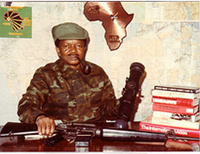This Day in History: March 25, 1963
Additional Date: March 25, 1963
Potlako Leballo, the leader of the Pan Africanist Congress (PAC), confirmed in Maseru, Basutoland (now Lesotho), that Poqo and the PAC are one and the same organisation. Leballo went further to say that the organisation’s revolutionary council was planning the timing and manner of an uprising to be launched in South Africa in 1963.
At the time of his claims, the PAC, African National Congress (ANC), the Communist Party of South Africa (CPSA)and other liberation movements were banned by South African government. They were banned in April 1960 under the Unlawful Organisations Act (commenced 7 April 1960), but the CPSA was banned earlier in 1950 under the Suppression of Communism Act, and re-launched in 1953 as the South African Communist Party (SACP).
Poqo continued to operate clandestinely, particularly in the Eastern and Western Cape. Between the end of 1962 and the middle of 1963 Poqo carried out a number of attacks on persons believed to be working with the security police to stem the tide of popular unrest. These included Black police officers and officials working in local government offices. Several attempts at assassinating Chief Kaizer Matanzima failed, leading to the arrest of those involved.
Scores of Poqo operatives were arrested, put on trial and convicted of offences ranging from murder, attempted murder and arson. The majority of them were executed between 1963 and 1968, leading to the collapse of Poqo inside South Africa. It took a while longer to reorganise Poqo in exile.
